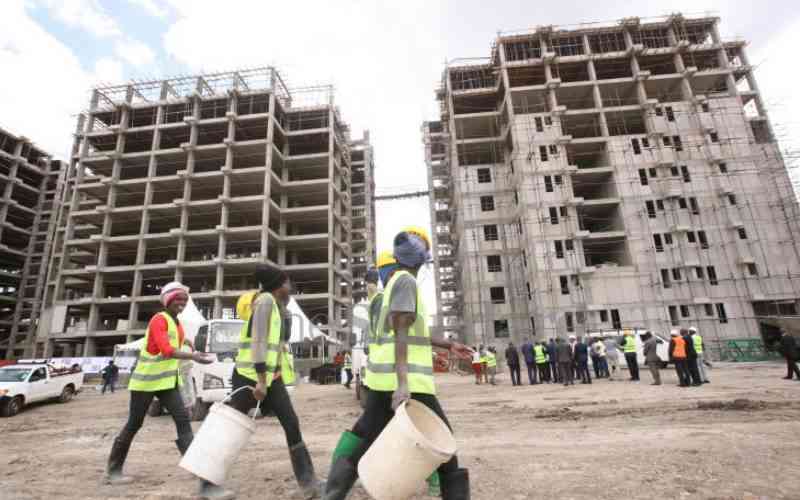 |
|
Part of the Victoria Courts showroom in Westlands. PHOTO/ MKALA MWAGHESHA |
Nairobi; Kenya: 1. Are Victoria Courts and Victoria Furnitures one and the same thing?
Victoria Furnitures was started in 1969. Victoria Courts, on the other hand, started about two years ago. It is a partnership between Victoria Furnitures and a company called Courts from Mauritius, which has 33 stores.
2. You want to replicate the success achieved in Mauritius in Kenya?
That is the grand plan. Currently, we have two stores: one in Westlands and the other on Koinange Street. We are opening a third store at Garden City Mall in March 2015.
In the next 10 years, we plan to have 30 to 40 stores across the East African region to serve the middle-income and high-end markets, not forgetting working with architects, hotels and offices.
3. With so many interior companies in Kenya, what do you believe is your selling point?
First, the showroom ambiance is unmatched. Second, we offer top level service for all customers. Third, we offer a wide array of products in home and office furniture, kitchen ware and electronics.
Final and most important is the price. Contrary to what many think, our products are fairly-priced. For most items, we offer credit facilities supported by the financial institutions we have partnered with.
That means any salaried customer can get whatever product they want from our stores.
4. But the perception is that Victoria Courts, like many interior companies, is for the high-end of the market and not for the average urban dweller...
The middle-income market is also responding well to our products. Our products and stores are tailor-made to fit the local market and to serve both the high-end and middle-income markets.
We believe in buy Kenya, build Kenya, and that is why we have contracted local companies to manufacture affordable furniture for us.
We also offer Gautier - the stylish French living brand - whose products are well-researched and are becoming popular around the globe.
5. What are you doing to change the perceptions people have about your store and the interior market in Kenya in general?
We are doing aggressive marketing as we are new in the market. We are also making sure the experience our customers get is unmatched. Like the hospitality industry, our market relies on word-of-mouth.
Stay informed. Subscribe to our newsletter
6. Any challenges so far?
Only one. Being new in the market is a disadvantage that we are working day and night to overcome. Recognition is an uphill task for a new entity but we are bringing down the barriers.
7.What impact is the growth of Kenyan’s property market having on your business?
The growth is pushing us. Most people aspire to own a home and live the good life. Industry data and trends show there will be further growth in coming years.
The furniture market will also benefit from this growth. We are currently at the infant stage but as the country moves into middle-income status and the appetite for quality living currently being witnessed grows, we will grow.
I think the furniture market will be at near maturity in about ten years.
8. From your perspective, what are the current trends in the market as informed by your sales?
The market is currently divided into two: One, there is a customer base that is solely concerned with lifestyle. This top-end market is looking for products that will complement their lifestyle whether rustic, contemporary or modern.
The other segment is more concerned about space and the furniture bought is set to fit a given area. On the retail side, we have to take into account both segments to accommodate the different tastes.
Furthermore, trends come and go and we have to ensure we stock current pieces.
9. The market is said to be vibrant and lucrative with property and land prices rising each day. But in the true sense, is the market responding to what home buyers and renters are looking for?
The top-end of the market is looking for security and that is why gated communities are becoming increasingly popular. The low-end are on the lookout for affordable housing, and high-density, low-quality flats are responding to that need.
10. What do you think is the biggest malaise affecting the property industry?
There is a lot of greed. As much as we are all in it for the profit, there is a lot of poor workmanship even at some high-end properties in Kenya.
There is a need for policies that will protect the market from unscrupulous dealers.
 The Standard Group Plc is a
multi-media organization with investments in media platforms spanning newspaper
print operations, television, radio broadcasting, digital and online services. The
Standard Group is recognized as a leading multi-media house in Kenya with a key
influence in matters of national and international interest.
The Standard Group Plc is a
multi-media organization with investments in media platforms spanning newspaper
print operations, television, radio broadcasting, digital and online services. The
Standard Group is recognized as a leading multi-media house in Kenya with a key
influence in matters of national and international interest.
 The Standard Group Plc is a
multi-media organization with investments in media platforms spanning newspaper
print operations, television, radio broadcasting, digital and online services. The
Standard Group is recognized as a leading multi-media house in Kenya with a key
influence in matters of national and international interest.
The Standard Group Plc is a
multi-media organization with investments in media platforms spanning newspaper
print operations, television, radio broadcasting, digital and online services. The
Standard Group is recognized as a leading multi-media house in Kenya with a key
influence in matters of national and international interest.









